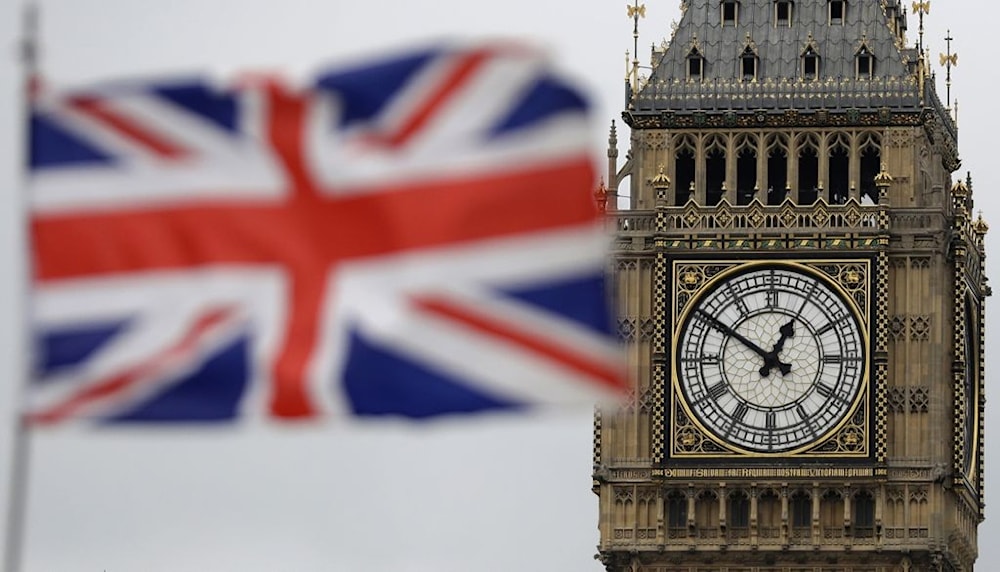UK to have weakest performing economy among G7 next year: Think tank
Paris-based think tank OECD forecasts that Britain will be at the bottom of G7 growth rates in 2025.
-

A British flag is shown near Big Ben's clock tower in front of the Houses of Parliament in central London on March 29, 2017. (AFP)
Britain will have the weakest economic performance among G7 countries next year, the Organisation for Economic Cooperation and Development (OECD) said on Thursday, attributing it to high interest rates and the lasting impacts of last year's inflation surge.
The think tank also downgraded its forecast for British economic growth from 0.7 percent last November to 0.4 percent.
The OECD added that the UK will plunge to the bottom of G7 economic growth rates in 2025 with a growth of 1 percent, directly behind Germany at 1.1 percent. Meanwhile, the United States and Canada will top the chart as the fastest-growing member economies at 1.8 percent for both.
Read more: UK economy falls into recession despite Sunak's regulation vow
Bank of England may postpone interest rate cut
The Paris-based institution stated that the UK's economic growth would be hindered by ongoing price increases in the services sector and a shortage of skilled workers, which will delay anticipated reductions in interest rates.
The think tank expects that the Bank of England will postpone the initial interest rate cut from 5.25 percent until autumn of next year, citing concerns that price growth may rebound.
This comes despite the OECD releasing a positive outlook for world economies, despite the ongoing war in Ukraine and military tensions in the Middle East.
“There are some signs that the global outlook has started to brighten, even though growth remains modest,” it said in a semi-annual report.
Read more: Red Sea shipping attacks may affect UK economy: Finance Minister
Global GDP growth is forecasted to remain stable at 3.1 percent in 2024, the same as in 2023, and is expected to increase slightly to 3.2 percent in 2025. This growth is anticipated to be supported by stronger growth in household incomes and lower interest rates.
Recovery expected in eurozone
The OECD has revised upwards the growth rates for France, Germany, and the US for 2024. However, Germany's growth rate of 0.2 percent would be lower than that of the UK this year.
A recovery is expected in the eurozone, while growth is expected to slow down in the US, India, and other emerging-market economies.
The annual consumer price inflation in the G20 economies is expected to gradually decrease. This will be aided by diminishing cost pressures, resulting in a decline to 3.6 percent in 2025 from 5.9 percent in 2024.
“By the end of 2025, inflation is projected to be back on target in most major economies,” the report said.
Addressing the British government, the OECD said that chancellor Jeremy Hunt, “should remain prudent and focus on productivity-enhancing public investment”. It added that any increase in government spending should occur only after interest rates have decreased.
Read more: Former UK FM: Brexit made the UK a lower-status nation
“Fiscal prudence is required as inflation remains above target, and spending is to be directed towards supply enhancing investment, including infrastructure, the National Health Service, and adult skills,” the report said.
“Proceeding with the childcare reform will help tackle economic inactivity, but requires contingent planning to address potential bottlenecks, in particular likely staff shortages.”
Commenting on the report, Hunt said: “This forecast is not particularly surprising given our priority for the last year has been to tackle inflation with higher interest rates.
“But now we are winning that war, growth matters which is why it is significant that last month the IMF predicted the UK will grow faster over the next six years than any European G7 country or Japan. To sustain that we need to stick to our plan – competitive taxes, a flexible labour market and far-reaching welfare reform.”
Read more: US, UK aggression on Yemen increases oil prices, risks of inflation

 4 Min Read
4 Min Read









